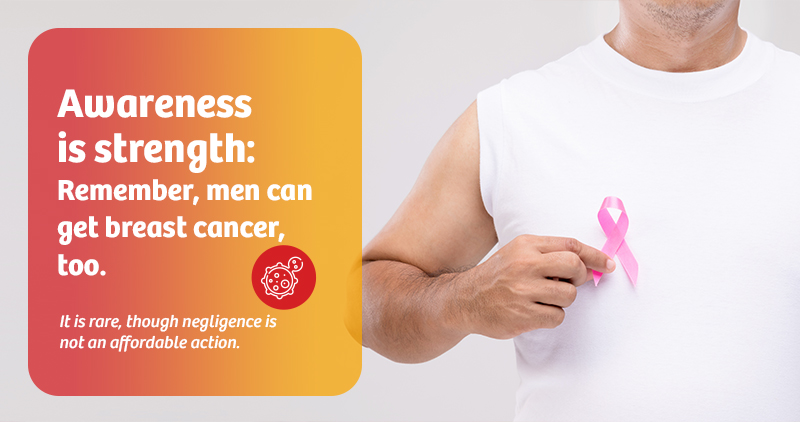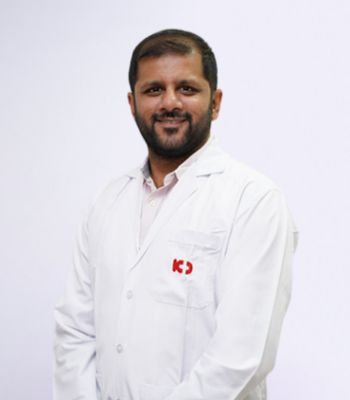

By Dr Kush Shah
Consultant Surgical Oncologist & Robotic Surgeon
Nov 29 , 2024
Breast cancer is predominately seen as a women’s disease. When we talk about breast cancer in females, the total number of cases in 2022 was 1.46 million, which is increasing and, as per the ICMR projection, by 2025, will reach 1.57 million. It is worrisome. Many social and healthcare organizations are prominently working towards it. But at the same time, it is essential to recognise that men can also be affected by breast cancer.
In India, awareness of male breast cancer remains limited, and it is often overlooked in discussions about cancer. This lack of understanding contributes to late diagnoses, leading to poorer outcomes. There is an urgent need to focus more on this issue and promote early detection to improve survival rates.
It is rare, though negligence is not an affordable action. As per the Indian council of medical research (ICMR), the incidence of breast cancer in men is approximately 1.2% of all breast cancer cases. In absolute numbers, around 1,000 to 2,000 cases are reported annually. It represents a concerning trend as awareness of male breast cancer is often overshadowed due to a significant focus on female cases.
Cases of male breast cancer are not huge in numbers. It is about 0.5 to 1.0 per 100,000. According to recent research, most cases are diagnosed between 50 and 70, although cases in younger men are increasing. Male breast cancer is a disease in which malignant cells form in the tissues of the breast.
Old age: The risk of male breast cancer increases with age. It is seen more often in the 60s, but should not ignored early age symptoms.
Hormone therapy for prostate cancer or medicine containing estrogen: If hormone therapy is taken as a part of prostate cancer or the use of estrogen medication increases the chances of breast cancer in males.
Genetic factors: A family history of breast cancer or genetic mutations, particularly in BRCA2, are at higher risk. Around 10% to 15% of male breast cancer cases are linked to hereditary factors.
Hormonal imbalance: Conditions that elevate estrogen levels, such as obesity, liver disease, or certain testicular conditions, can increase the risk.
Radiation exposure: If radiation has been taken during previous treatment, like lung cancer, chances are high.
Klinefelter syndrome: This genetic disorder, characterized by an extra X chromosome, is associated with a higher likelihood of male breast cancer.
Liver Disease: Certain conditions, such as cirrhosis of the liver, can develop hormonal imbalances, and that raises the chances of breast cancer in males.
Obesity: Due to obesity, estrogen increases in the body, and that can also develop breast cancer in males.
Testicle disease or surgery: Having inflamed testicles, called orchitis, or surgery to remove a testicle, called orchiectomy, can increase the risk of male breast cancer.
It includes,
Similar to female breast cancer treatment only, there are no significant changes, which include:
Surgery: Options include lumpectomy (removal of the tumour) or mastectomy (removal of one or both breasts).
Radiation therapy: Often implemented after surgery to reduce the risk of recurrence.
Chemotherapy: Used primarily for more aggressive forms of cancer or after surgery.
Hormone therapy: Effective for hormone receptor-positive cancers, this treatment can help block the effects of estrogen.
Immunotherapy: Used to treat high-risk curable (first-stage) and metastatic triple-negative breast cancer.
Best hospital for breast cancer treatment in Ahmedabad.
Prioritise regular check-ups and encourage open discussions about breast health. Awareness can save lives—don’t hesitate to consult an expert. Breast cancer needs focused care, and if it happens, there is hope. At KD Hospital, Ahmedabad, we understand that the fight against this cancer requires a multifaceted approach. Our team of expert oncologists, surgeons, radiotherapists, and supportive care specialists collaborate to create a personalised treatment plan for your health needs. With advanced technology, surgical techniques, and compassionate patient-centred care, KD Hospital provides the best possible treatment to fight against breast cancer.